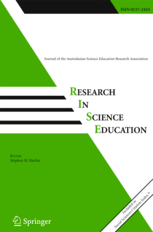
RESEARCH IN SCIENCE EDUCATION
Scope & Guideline
Transforming Science Education with Insightful Research
Introduction
Aims and Scopes
- Integration of STEM Education:
The journal emphasizes the integration of STEM (Science, Technology, Engineering, and Mathematics) education, exploring innovative pedagogical approaches that combine these disciplines to enhance learning experiences and outcomes for students. - Socioscientific Issues:
Research on socioscientific issues, which are complex social and ethical dilemmas related to science, is a significant focus. The journal examines how these issues can be integrated into curricula to promote critical thinking, reasoning, and engagement among students. - Pedagogical Content Knowledge:
The development and assessment of teachers’ pedagogical content knowledge (PCK) is a recurring theme, highlighting the importance of teachers' understanding of both content and effective teaching strategies in science education. - Digital Tools and Learning Environments:
The journal explores the role of digital tools and online learning environments in science education, investigating how technology can enhance student engagement, collaborative learning, and the development of scientific competencies. - Inquiry-Based Learning:
A strong emphasis is placed on inquiry-based learning methodologies, where students engage in scientific practices through hands-on activities and investigations, fostering deeper understanding and motivation in science. - Equity and Diversity in Science Education:
The journal addresses issues of equity and diversity, investigating how various factors, including gender, socio-economic status, and cultural backgrounds, influence students' experiences and outcomes in science education.
Trending and Emerging
- Entrepreneurial STEM Education:
There is a rising interest in integrating entrepreneurial principles into STEM education, focusing on fostering resourcefulness, problem-solving skills, and innovation among students, which aligns with the demands of the 21st-century workforce. - Artificial Intelligence in Education:
Recent publications are increasingly exploring the applications of artificial intelligence in teaching and learning processes, investigating its potential to personalize education and enhance student engagement in science. - Social and Emotional Learning (SEL) in Science Education:
There is a growing trend towards incorporating social and emotional learning frameworks in science education, emphasizing the importance of students' emotional and social development alongside academic achievement. - Research on Science Identities:
A notable increase in studies focusing on students' science identities and how these identities influence their engagement and participation in science is evident, reflecting broader educational goals of inclusivity and diversity. - Use of Digital and Interactive Learning Tools:
The journal is witnessing an upsurge in research related to the use of digital tools, simulations, and interactive learning environments, which are seen as vital for enhancing student engagement and understanding of complex scientific concepts.
Declining or Waning
- Traditional Lecture-Based Instruction:
Research focusing on traditional lecture-based instruction methods is becoming less prevalent, as the journal increasingly prioritizes active learning and student-centered approaches that promote engagement and critical thinking. - Content-Only Focus:
There is a noticeable decline in studies that solely emphasize content knowledge without considering pedagogical strategies or the context of learning, reflecting a broader trend towards holistic educational practices that integrate content with process. - Single-Discipline Studies:
Papers centered exclusively on single-discipline science education are waning in favor of interdisciplinary approaches that combine insights from various fields, particularly in STEM contexts, to address complex educational challenges. - Teacher-Centric Research:
Research that focuses predominantly on teachers' perspectives without incorporating student voices or experiences is becoming less common, as there is a growing recognition of the importance of understanding the student experience in science education.
Similar Journals
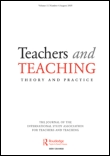
Teachers and Teaching
Exploring the Dynamics of Teaching and LearningTeachers and Teaching is a premier scholarly journal published by Routledge Journals, Taylor & Francis Ltd, providing an essential platform for researchers, educators, and practitioners in the fields of Education and Arts and Humanities. With an editorial focus on the dynamics of teaching and learning, the journal aims to share innovative research and insightful discussions that enhance pedagogical practices and policy development. Notably, it has achieved a Q1 ranking in both the Arts and Humanities and Education categories, signifying its impact and relevance in educational research, as reflected in its Scopus rankings, with an 84th percentile for Arts and Humanities and a 76th percentile in Education. Although it does not offer open access, the journal provides extensive access options for libraries and institutions, making its rich content available to a wide audience. Spanning from 1995 to 2024, Teachers and Teaching continues to set the standard for high-quality scholarship in the evolving landscape of education, inviting contributions that explore challenges and innovations in teaching methodologies.
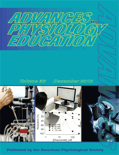
ADVANCES IN PHYSIOLOGY EDUCATION
Elevating Pedagogy in Physiology EducationADVANCES IN PHYSIOLOGY EDUCATION, published by the American Physiological Society, is a leading journal dedicated to the field of physiology education, with a commitment to advancing teaching practices and pedagogical strategies in this vital discipline. Established in 1998, the journal has consistently provided a platform for original research and discussion, fostering the improvement of educational methodologies. With an impressive impact factor and ranked in Q2 for Education and Q3 for Physiology, it reflects a robust academic influence within the research community. The journal ranks #458 out of 1543 in Social Sciences - Education and #130 out of 193 in Biochemistry, Genetics, and Molecular Biology - Physiology according to Scopus, highlighting its critical role in shaping physiology education. While it operates on a subscription model, its focus remains on promoting innovative education practices that benefit both educators and students alike. This journal is essential reading for anyone looking to enhance their understanding of physiology teaching and learning.
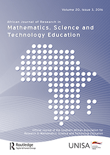
African Journal of Research in Mathematics Science and Technology Education
Empowering Educators Through Rigorous ResearchAfrican Journal of Research in Mathematics Science and Technology Education is a distinguished academic journal, published by Routledge Journals, Taylor & Francis Ltd, dedicated to advancing knowledge in the fields of mathematics, science, and technology education within the African context. With an ISSN of 1811-7295 and an E-ISSN of 2469-7656, this journal has been a crucial platform for scholarly discourse since its inception in 1997, steadily gaining reputation and impact among researchers, educators, and policymakers. The journal features a rigorous peer-review process, ensuring that high-quality research garners visibility across various disciplines, as evidenced by its Quartile rankings in Computer Science Applications, Education, Engineering, Mathematics, and Physics and Astronomy. With its commitment to serving the educational community and fostering innovative practices, the African Journal of Research in Mathematics Science and Technology Education plays a pivotal role in shaping the future of STEM education in Africa and beyond.
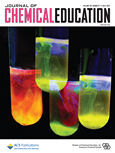
JOURNAL OF CHEMICAL EDUCATION
Bridging Theory and Practice in Chemical EducationJOURNAL OF CHEMICAL EDUCATION, published by the American Chemical Society, is a prestigious peer-reviewed journal dedicated to advancing the teaching and learning of chemistry. With a longstanding history spanning from 1924 to 2024, this journal plays a vital role in disseminating innovative research and pedagogical strategies that enhance educational practices in the chemical sciences. It boasts an impressive impact factor, ranking in the Q2 category for both Chemistry (miscellaneous) and Education in 2023, reflecting its significance within the field. The journal's robust Scopus rankings underscore its influence, with a percentile standing of 85th in Social Sciences _ Education and 67th in General Chemistry. Researchers and educators alike will benefit from its rich selection of articles and resources aimed at fostering effective teaching methodologies and improving student engagement in chemistry education. While currently not an open-access journal, readers can access its extensive archive and explore topics that bridge theoretical knowledge and practical application in the realm of chemical education.
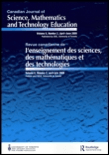
Canadian Journal of Science Mathematics and Technology Education
Exploring New Frontiers in Science, Math, and Technology LearningCanadian Journal of Science Mathematics and Technology Education (ISSN: 1492-6156; E-ISSN: 1942-4051) is a prominent publication by SPRINGER based in Switzerland, dedicated to exploring innovative methodologies and practices in the fields of science, mathematics, and technology education. Established in 2001 and continuing to 2024, the journal maintains a strong reputation within the academic community, reflected in its Q2 ranking in the Education category for 2023 and a commendable Scopus ranking that places it in the top 25% of journals within the social sciences education domain (Rank #383/1543). This journal serves as a critical platform for researchers, educators, and practitioners interested in the latest developments, research findings, and discussions pertaining to instructional strategies and curricular advancements. Although it is not open access, the journal's insights and contributions are invaluable for those aiming to elevate educational practices and address contemporary challenges in STEM education.

Ensayos-Revista de la Facultad de Educacion de Albacete
Fostering innovation in teaching and learning practices.Ensayos-Revista de la Facultad de Educacion de Albacete is a distinguished open-access journal dedicated to the field of education, published by UNIV CASTILLA-LA MANCHA, ESCUELA MAGISTERIO ALBACETE. Since its inception in 2011, the journal has provided a platform for high-quality research and innovative pedagogical practices, fostering academic discourse and collaboration among educators, researchers, and practitioners in the education sector. With an ISSN of 0214-4824 and E-ISSN 2171-9098, it is committed to disseminating knowledge that enhances educational outcomes and promotes effective teaching methodologies. The journal is located in Albacete, Spain, and emphasizes the importance of educational research in shaping contemporary educational frameworks. By ensuring open access to its content, Ensayos makes its research widely available, allowing for greater impact and engagement within the academic community. This commitment to accessibility positions the journal as a valuable resource for anyone invested in the advancement of education.

Journal of Science Education and Technology
Empowering Educators, Transforming Futures.The Journal of Science Education and Technology, published by SPRINGER, stands as a premier platform in the fields of education and engineering, recognized with a prestigious Q1 ranking in both categories as of 2023. With an ISSN of 1059-0145 and an E-ISSN of 1573-1839, this journal serves as a pivotal resource for researchers, educators, and practitioners alike, emphasizing the integration of scientific inquiry and technological advancements in educational contexts. Since its inception in 1992, the journal has consistently provided high-quality, peer-reviewed research that shapes contemporary practices and methodologies in science education. With its notable Scopus rankings, including a 95th percentile in Social Sciences Education, the journal is essential for anyone eager to enhance their understanding of effective teaching in STEM fields. While the journal is not open access, its contributions are invaluable to advancing knowledge and innovations that are crucial for the progressive education landscape, making it a must-read for scholars and students committed to excellence in science education.

Chemistry Teacher International
Connecting Educators, Researchers, and PractitionersChemistry Teacher International is a prominent peer-reviewed journal dedicated to the field of chemistry education, published by WALTER DE GRUYTER GMBH. With its Open Access policy since 2018, this journal ensures that research is widely disseminated to educators, researchers, and practitioners globally. Located in Berlin, Germany, it aims to promote innovative teaching methodologies and practical applications in chemical sciences. The journal has consistently achieved a Q2 ranking in both the Chemistry (Miscellaneous) and Education categories as of 2023, reflecting its relevance and impact within the academic community. Over its converged years from 2019 to 2024, Chemistry Teacher International fosters a collaborative platform for sharing research, insights, and pedagogical strategies, thereby contributing to the advancement of chemistry education on a global scale.
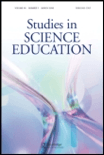
Studies in Science Education
Exploring Innovations in Science EducationStudies in Science Education is a prestigious journal published by ROUTLEDGE JOURNALS, TAYLOR & FRANCIS LTD, renowned for its commitment to advancing the field of science education. With an impressive impact factor, and categorized in the Q1 quartile within the Education domain, this journal ranks among the top in the field, currently holding the 16th position out of 1543 social science education journals, placing it in the 98th percentile according to Scopus rankings. Since its inception in 1974, it has provided a rigorous platform for researchers, practitioners, and educators to explore, debate, and disseminate significant findings relevant to science education. Although the journal does not offer open access options, it ensures high visibility through its well-curated content, including empirical studies, theoretical discussions, and innovative practices aimed at enhancing educational outcomes in science. By continuously engaging with contemporary educational challenges, Studies in Science Education serves as an essential resource for those dedicated to improving science teaching and learning worldwide.
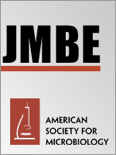
Journal of Microbiology & Biology Education
Fostering Innovation in Biological Sciences EducationJournal of Microbiology & Biology Education, published by the American Society for Microbiology, serves as a vital platform for advancing knowledge and education in microbiology and related biological fields. With an ISSN of 1935-7877 and an E-ISSN of 1935-7885, this open-access journal has been fostering scholarly communication since 2000, ensuring that vital research is accessible to a global audience. The journal covers a broad scope within the disciplines of Agricultural and Biological Sciences, Biochemistry, Genetics, Molecular Biology, and Educational methodologies, holding a significant position as reflected by its Q2 quartile rankings in multiple fields for 2023. The Scopus ranking highlights its relevance, ranking it in the 64th percentile in general Agricultural and Biological Sciences and Education, and 48th in Immunology and Microbiology. Positioned in the United States, the journal addresses the imperative need for educational resources and research dissemination in the ever-evolving landscape of microbiological sciences. Researchers, professionals, and students will find invaluable insights and pedagogical innovations within its pages, advancing both academic inquiry and educational practice.